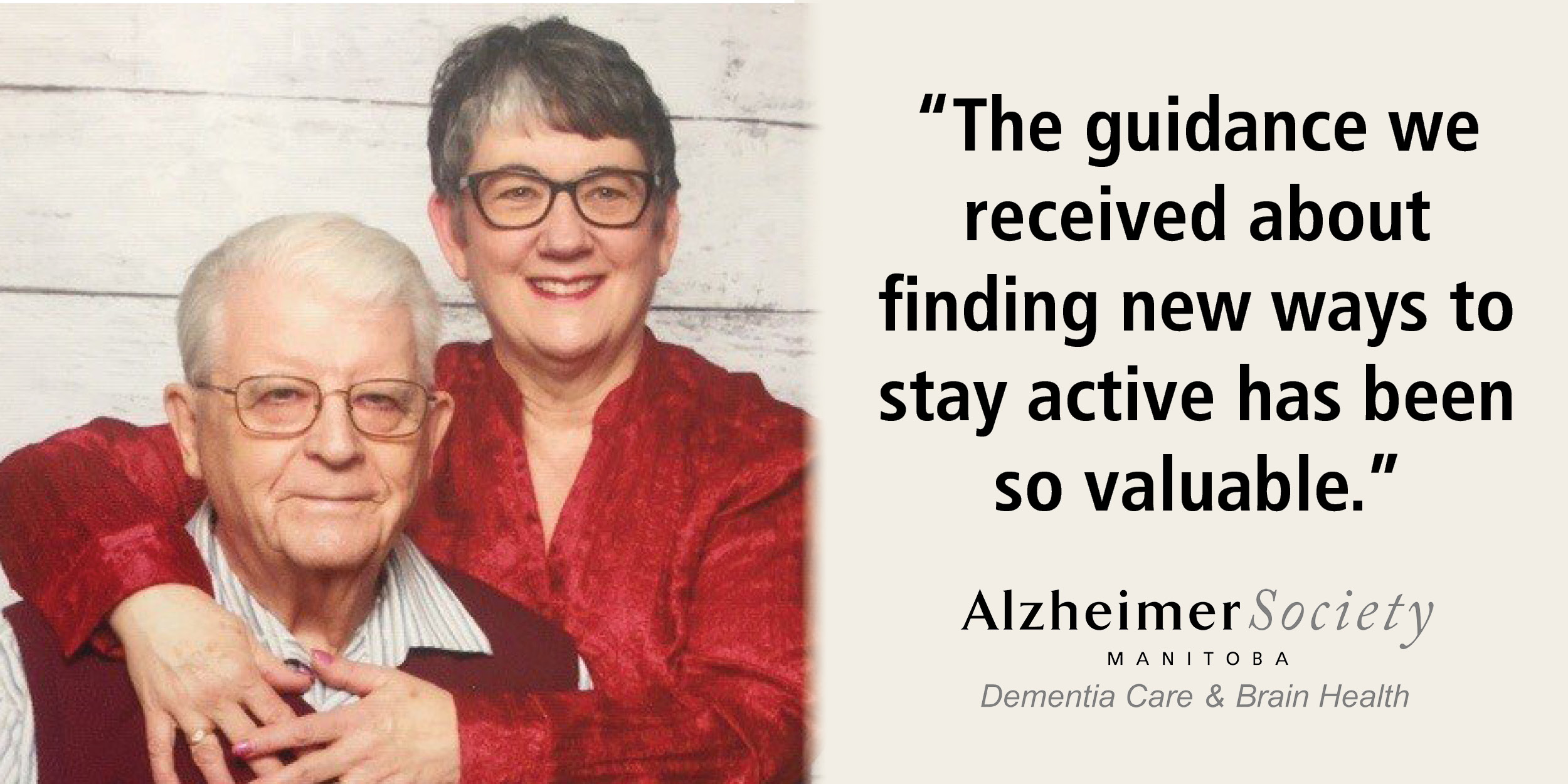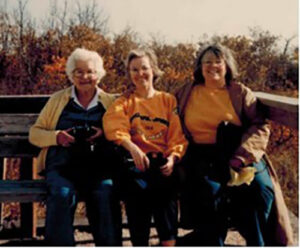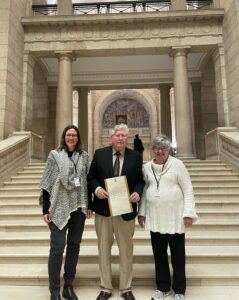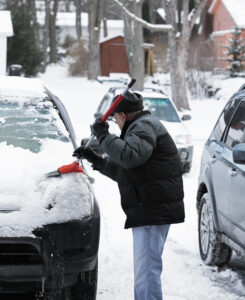Finding Support Through Community
Alzheimer Society Volunteer Makes an Impactful Investment
Seniors’ and Elders’ Month Proclamation
Learn About Dementia-Friendly Communities
Dementia and Driving: Winter Edition
PhD Student Receives Research Funding
New Research Program Partnership
What is Mixed Dementia?
Dementia Care Series – Register Today!
Join us for our Fall Family Education
Join our NEW Support Groups!
Finding Support Through Community

Jill and Keith Kennedy have always been active and social, so after Keith was diagnosed with early-onset Alzheimer’s in April 2020, they wondered if their lifestyle would change.
Before Keith’s diagnosis, Jill began noticing changes in Keith’s daily life. “At first, we thought it was just signs of aging: forgetting words or walking slower,” Jill says. “Then he began using a notepad to keep track of familiar things, like street names or names of family members we don’t see often.”
After meeting with a senior’s mental health counsellor and many consultations with his family doctor and a geriatrician, Keith eventually received an Alzheimer’s diagnosis.
Jill reached out to the Alzheimer Society of Manitoba for more information on dementia and learned about different support groups and community programs, like Minds in Motion®.
“We both enjoy Minds in Motion. The social time is fun, the chair yoga is invigorating and the games are great,” Jill says. “We have lots of laughs which creates good memories and makes us want to go back again.”
Jill also began attending a Care Partner Support Group. She believes staying social and connecting with others is the best way to gain support.
“One thing that might hold people back from asking for help is the stigma – they might feel embarrassed and not want people to know. When you open yourself up, it’s easier to get support. Let family know. Let friends know.”
Jill says their seasonal campsite at Aspen Grove provides many opportunities for socializing, and they have a lot of supportive friends and neighbours. She even recently surprised Keith with an electric golf cart for them to drive around the campground.
“Keith had to give up his driver’s license following his diagnosis, which was disappointing for him, so he loves being able to drive the golf cart because it gives him a sense of independence,” Jill says. “The guidance we received about finding new ways to stay active has been so valuable.”
Jill and Keith feel a lot of support from the Alzheimer Society and their surrounding community. It’s been over two years since Keith’s diagnosis, and their schedules are packed with fun activities and social events.
“The more info you can get from the Alzheimer Society and other community resources, the better,” Jill says.
The Alzheimer Society’s First Link® Client Support program connects people living with dementia and their families to information, support services and education as early as possible and throughout the progression of their dementia journey. To learn more about the First Link® Client Support program, click here.
Alzheimer Society Volunteer Makes an Impactful Investment

Wendy with her mother, Bernice, and sister, Peggy, on Thanksgiving weekend 1988
Wendy Barker has seen first-hand the positive effects of Alzheimer Society programs. As a Minds in Motion® volunteer for the past seven years, she’s connected with many people in their journeys with dementia. Wendy and her husband recently decided that in addition to their gift of volunteer time, they are leaving a gift to the Alzheimer Society in their Will.
Wendy’s personal journey with dementia began in the mid-1990s when her mother started showing signs of Alzheimer’s. Around this time, Wendy reached out to the Alzheimer Society for support and information on treatment options.
“My mother was adamant about staying in her home and not moving to a personal care home,” Wendy says. “The Alzheimer Society helped my family and I navigate this difficult situation and connected us to resources that were really helpful.”
Although her mother’s journey with Alzheimer’s was certainly the biggest impact that dementia has had on Wendy’s life, she says other family members have also been diagnosed.
“It’s difficult to hear a dementia diagnosis, but the Alzheimer Society has programs, like Minds in Motion, that make life a little better for people living with dementia and their care partners.”
Through her advocacy and volunteering, Wendy has had many friends and acquaintances turn to her for advice and she always has encouraging words to share.
“Your conversations and interactions with someone living with dementia are a bright spot in their day – even if they don’t know who you are in that moment,” Wendy says. “You bring them joy.”
Leaving a gift to an organization that means a lot to Wendy seemed like a great way to continue to give back. Including a charitable gift in your Will can also reduce the amount of estate tax paid.
“I would encourage people to work on their Wills,” Wendy says. “I think it’s a good investment to protect your family, so they know what to do with the estate. And if you include a donation to the Alzheimer Society – that’s even better!”
If you, like Wendy, are considering a charitable gift in your Will there is a special calculator on the Will Power website that may help get you started. You can also contact our Director of Development, Lorraine Decock at 204-943-6622 or [email protected] for more info.
Seniors’ and Elders’ Month Proclamation

October 2022 has been proclaimed Seniors’ and Elders’ Month!
On October 12, 2022, Erin Crawford, Program Director from the Alzheimer Society, joined Chair of the Minister’s Advisory Committee on the Senior Strategy, Connie Newman, at the legislature for an important announcement. The two witnessed the Minister of Seniors and Long-Term Care, Scott Johnston, make the Seniors’ and Elders’ Month proclamation.
It’s important for the government to recognize the contributions seniors and elders make to Manitoba’s communities. The province’s proclamation acknowledges seniors’ and elders’ diverse backgrounds, accomplishments, and values. The proclamation notes that “seniors and elders enrich lives by listening and sharing their extensive knowledge, wisdom and skills through working, volunteering and caregiving.”
The Alzheimer Society of Manitoba also continues to advocate to the Government of Manitoba to ensure appropriate supports and services are in place for Manitobans as they age – especially as families face the difficult journey of a dementia diagnosis.
Click here to view the Seniors’ and Elders’ Month October 2022 proclamation.
Learn About Dementia-Friendly Communities

A dementia-friendly community is a place where people living with dementia feel included and supported. For people living with dementia, especially those who are experiencing early to moderate dementia symptoms, getting out and involved in the community is an important part of maintaining a meaningful quality of life. However, this can be easier said than done. Individuals and organizations should consider the specific physical and social needs of people living with dementia to make community spaces accessible.
If you want to learn more about dementia-friendly communities, you can check out the upcoming national webinar, A Dialogue About a Dementia-Friendly Experience in Recreation and Libraries. Presenters Heather Cowie from the Alzheimer Society of British Columbia and Manitoba’s own Barret Miller from FortWhyte Alive will discuss dementia-friendly communities and introduce several resources to support creating these spaces.
Barret Miller will also speak about the steps FortWhyte Alive made to become more dementia friendly. FortWhyte Alive launched their first dementia-friendly program, Tales Along the Trail, in Fall 2021 in partnership with the Alzheimer Society of Manitoba. Tales Along the Trail gives people living with dementia and their care partners the opportunity to experience a calming guided tour through Manitoba’s prairie lands.
A Dialogue About a Dementia-Friendly Experience in Recreation and Libraries takes place online on Thursday, November 24, 11 am to 12 pm. Click here to register.
Dementia and Driving: Winter Edition

With another Manitoba winter just around the corner, it’s time to start thinking about driver safety.
While this is important for everyone, it is especially important for families impacted by dementia. Most people with early symptoms of dementia can continue to drive safely and competently, but it is important to be aware of potential changes in driving patterns.
Some changes to watch for include:
- Forgetting to signal, use mirrors properly or check blind spots
- Getting lost in familiar areas
- Being unable to correctly judge distances
- Failing to follow road signs correctly or use good judgement to make safe driving decisions
- Getting into small accidents or hitting curbs
- Difficulty paying attention
If you are noticing changes in driving patterns that may seem unsafe, here are a few things you can do:
- If able, have a conversation early on about future driving plans for when abilities change. Consider using “what if” situations
- Be a good listener and understand their transportation needs, whether that’s outings to the store, appointments, or social activities
- Talk with other passengers, friends or family about unsafe driving incidents
- Offer alternatives to driving, like food delivery services or carpooling. Also consider local transportation options, like car services or transit
- Discuss alternative and safer driving options, like alternatives for highway driving or safety options for driving at night
- Consult people with special knowledge. You can collect information about driving courses, visit a family doctor for a medical check-up or talk to a doctor separately about your safety concerns
- If you start to notice anything of concern, consider an evaluation by a health care provider
If you care for someone living with dementia who will be driving this winter, it’s best to plan ahead. Winter driving challenges like poor visibility, skidding and getting stuck, pose a challenge to the most experienced drivers. It’s also a good idea to check weather forecasts and any road condition alerts. The safest strategy is to avoid driving in harsh weather conditions.
For more information, check out the website drivinganddementia.ca
PhD Student Receives Funding for Dementia Prediction Model

Jarrad Perron’s passion for science began when he was a kid. He used to sit in front of the T.V. and watch Bill Nye (the Science Guy) and The Magic School Bus which fueled his brain with curiosity and inspiration. Now, Jarrad is forming his Biomedical Engineering PhD thesis on researching how neuroimaging data can be used to predict the onset of dementia. Jarrad’s research is being supported by the Alzheimer Society of Manitoba’s Student Fellowship program, which grants an award valued at $4,000.
Mild cognitive impairment (commonly referred to as MCI) affects memory and other abilities, but not as severely as dementia. One can still carry on their daily functions and routines without interruption. However, there is a higher risk of developing dementia. Those with mild cognitive impairment who do not develop dementia remain stable and do not need any dementia-specific treatments or care.
Using his expertise in neuroimaging, Jarrad aims to create a model that can predict if someone living with mild cognitive impairment will later develop dementia.
“The dementia treatments that exist right now are most effective when someone is in the mildly impaired stage, but since dementia cannot be accurately predicted this early, it is unethical to treat every person in this cognitive stage,” Jarrad says. “This is why an accurate prediction model used in clinical settings would make so much difference.”
Jarrad says neuroimaging is his method of choice for predicting dementia since it is relatively common, inexpensive and completely noninvasive. Neuroimaging data (images/maps of the brain) along with clinical and behavioural data will give doctors the information needed to identify dementia earlier and more reliably than clinical evaluation alone.
“It’s tremendously worthwhile work,” Jarrad says. He hopes his research will be able to help thousands, if not millions of people in the future.
While he continues his research, Jarrad will also be volunteering his time and facilitating a support group with the Alzheimer Society this November. He looks forward to meeting community members and hearing about their experiences.
New Research Program Partnership

A new partnership between Research Manitoba and the Alzheimer Society of Canada Research Program (ASRP) is advancing dementia research and accelerating new discoveries by investing in Manitoba’s best and brightest dementia researchers.
Through the ASRP and Research Manitoba partnership, $450,000 is available to support researchers focused on investigating new insights into causes, prevention, diagnosis, treatment and management of Alzheimer’s and other dementias.
Four awards and grants are available to eligible researchers, with priority of funding going to researchers that will have a significant impact on the lives of people living with dementia and their care partners.
To learn more about dementia research being done in Canada, check out the Alzheimer Society Research Program.
Types of Dementia Series: What is Mixed Dementia?

Dementia is an umbrella term used to describe a range of neurological conditions affecting the brain that get worse over time. The term refers to a loss of cognitive functioning – in thinking, remembering and reasoning – to the degree that interference with a person’s daily life and everyday activities occurs. In this series, we take a look at several different forms of dementia, with this installment covering mixed dementia.
Because different types of dementia can have different causes, it’s possible for a person to have more than one type of dementia. When this happens, it’s known as mixed dementia.
The combination of two or more dementias will likely have a greater impact on a person’s brain than experiencing one dementia alone. This can affect how a person progresses through the stages of dementia.
What are the signs of mixed dementia?
A person living with mixed dementia will show symptoms of at least two different types of dementia. Usually, mixed dementia consists of the two most common types: Alzheimer’s and vascular dementia.
For example, a person with mixed dementia may show symptoms of both Alzheimer’s and vascular dementia. Because many symptoms overlap between different types of dementia, it can be hard to figure out if someone has mixed dementia.
Because of its nature, mixed dementia is difficult to diagnose. If you think you are experiencing signs of dementia, keep a list of the symptoms that you notice and discuss them with your doctor.
How many people have mixed dementia?
Researchers don’t know exactly how many people currently diagnosed with a specific type of dementia actually have mixed dementia.
Some experts recommend suspecting mixed dementia whenever a person has both evidence of cardiovascular disease and dementia symptoms that get worse slowly over time. Evidence like this may indicate the presence of both Alzheimer’s and vascular dementia.
For more information, contact the Alzheimer Society of Manitoba at 204-943-6622 and ask to speak to a client coordinator.
Dementia Care Series – Register Today!
Essentials of Day-to-day Dementia Care – Sponsored by All Seniors Care

We invite you to our Dementia Care Professional Development Series! Sessions are geared towards health care staff and take place online monthly until March 2023.
Join our session on Thursday, December 1 from 10:30 – 11:30 am called Practical Strategies for Incorporating Music Therapy in Day to Day Care featuring Becky Dowson who will lead participants through an interactive event building from last year’s session that will further delve into useful techniques for people living with dementia and that focus on such areas as orientation, arousal, memory, attention and mood.
This professional development series, which started in April, is focusing on the foundation for successful and meaningful dementia care that will benefit the person living with dementia, their families and the healthcare system as a whole. For a $20 registration fee, you can watch all 4 remaining live presentations and get access to recordings of all 11 sessions!
Visit our website today for upcoming sessions, speaker bios and to register today!
Join us for our Fall Family Education

Come join our education sessions as we cover a wide range of topics – from the progression of dementia to legal and financial matters. The sessions are geared towards helping people with dementia and their care partners be confident on their dementia journey.
Click here to see what’s coming up.
Join our NEW Support Groups!

Fall is a great time to join one of our many virtual or in-person support group offerings.
Support groups provide participants with an opportunity to learn more about dementia and its progression, share feelings and common experiences, exchange practical coping strategies and mutual support, as well as participate in meaningful discussions.
These support groups are a confidential and safe place for care partners to share their experiences of caring for a person with dementia or memory loss. We welcome everyone to this inclusive environment for people of different ethnicities, cultures or persons who identify as part of the 2SLGBTQ+ community.
Care Partner Support Groups
In recent months we gathered feedback about potential new care partner support groups that might better suit the needs of caregivers as they navigate their dementia journey. We listened and now have three new care partner support groups! It’s important for participants to relate and feel comfortable talking with others in similar situations.
NEW – Men’s Coffee Talk Support Group
Meets in-person at the provincial office in Winnipeg on the fourth Thursday of the month from 10:00 to 11:30 am.
This support group is for male-identifying care partners to connect with one another and share information about their experience of caring for a person with Alzheimer’s or another dementia.
NEW – Spouses of People Living with Dementia in Personal Care Home
Meets in-person at the provincial office in Winnipeg on the second Wednesday of the month from 2:00 to 3:30 pm.
This support group offers spouses of people with dementia living in a personal care home the opportunity to meet and share information about their experience of caring for someone who has transitioned into long-term care. This caregiving experience presents unique challenges for care partners as they:
- navigate their role changes,
- adjust to changes in self-identify
- adjust to living separately from their spouse
- help to support a spouse in their dementia journey
Virtual Support Group for Care Partners of People with Younger Onset Dementia
The support group offers care partners the opportunity to meet and share information about their experience(s) of caring for a person with younger onset dementia, when symptoms present and/or diagnosis occurs prior to the age of 65 over ZOOM.
- NEW – First Monday of the month from 7:00 to 8:30 pm
- Third Monday of the month from 7:00 to 8:30 pm
Virtual Support Group for Adult Children
Meets on the first Monday of the month from 7:00 to 8:30 pm.
This support group meets monthly over Zoom to discuss the role of adult children caring for a parent with dementia, and the unique challenges presented for adult children in this role.
Virtual Support Group for Spouses
Meets on the third Monday of the month from 7:00 to 8:30 pm.
This Support Group meets monthly over Zoom to discuss the role of spouses who are caring for a partner with dementia.
Virtual Ambiguous Loss Support Group
The Ambiguous Loss Support Group assists care partners to work through the feelings of ambiguous loss and grief that are experienced when someone close to you has dementia. The goal is to help care partners build up enhanced coping strategies that will support you in your role as a caregiver, and to help you plan for the future.
For more information, or to add your name to the waitlist for the next available session, please contact:
Samantha Holland
Interlake-Eastern Regional Coordinator
204-268-4752
[email protected]
*For a complete listing of all virtual and in-person care partner support groups, please visit our website.
Support Groups for Persons with Dementia
Having a diagnosis of dementia can lead to a variety of thoughts, feelings, and emotions. Our support groups for people with dementia provide participants with an opportunity to:
- Learn about dementia and its progression,
- Share feelings and common experiences,
- Exchange practical coping strategies and mutual support,
- Participate in meaningful discussions.
For more information about current and upcoming support group opportunities, both virtually and in-person, please contact:
Sarah Dueck
Client Support Coordinator & Group Lead, Winnipeg/Provincial Office
204-943-6622 ext. 213
[email protected]
Additional Information
For more information about all support group offerings, including information about registration, please contact the First Link Client Support team at 204-943-6622 or email us at [email protected].
Our new support groups were made possible by a multi-year commitment for our First Link® program from the Jessiman Foundation. A heartfelt thanks to the Jessiman family for this leadership gift that has allowed us to expand our programs in such a significant way.
Remember. You Are Not Alone.
We are here to help you and your family no matter where you are in your dementia journey. You can reach a comforting ear by phone or get a quick response by email. Call us at 204-943-6622 (Winnipeg), 1-800-378-6699 (toll free in Manitoba) or email [email protected]
